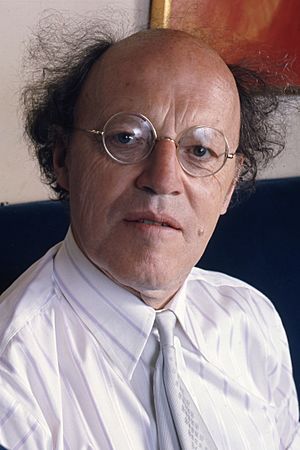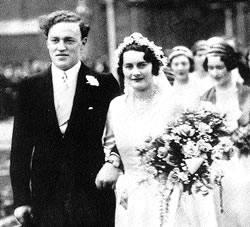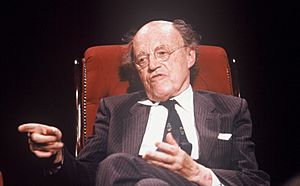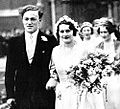Frank Pakenham, 7th Earl of Longford facts for kids
Francis Aungier Pakenham, the 7th Earl of Longford (born December 5, 1905 – died August 3, 2001), was a British politician and social reformer. He was known to his family as Frank Longford. He was a member of the Labour Party and served in important government roles, called "cabinet positions," many times between 1947 and 1968. Lord Longford was active in politics until he passed away in 2001. He came from an old, noble family in Ireland and was one of the few aristocrats (people with inherited titles) to hold high positions in a Labour government.
Longford was famous for helping people who were often ignored or had unpopular causes. He is especially remembered for working his whole life to improve prisons and the justice system. He visited prisons regularly for almost 70 years. He believed in helping prisoners get better and return to society. He also helped create the modern British system of parole in the 1960s. Parole allows prisoners to be released early under supervision. The Longford Prize is named after him and is given each year to people who have done great work in prison reform.
Quick facts for kids
The Earl of Longford
|
|
|---|---|

Longford in 1974
|
|
| Leader of the House of Lords | |
| In office 18 October 1964 – 16 January 1968 |
|
| Monarch | Elizabeth II |
| Prime Minister | Harold Wilson |
| Preceded by | The Lord Carrington |
| Succeeded by | The Lord Shackleton |
| Lord Keeper of the Privy Seal | |
| In office 6 April 1966 – 16 January 1968 |
|
| Monarch | Elizabeth II |
| Prime Minister | Harold Wilson |
| Preceded by | Sir Frank Soskice |
| Succeeded by | The Lord Shackleton |
| In office 18 October 1964 – 23 December 1965 |
|
| Monarch | Elizabeth II |
| Prime Minister | Harold Wilson |
| Preceded by | Selwyn Lloyd |
| Succeeded by | Sir Frank Soskice |
| Secretary of State for the Colonies | |
| In office 23 December 1965 – 6 April 1966 |
|
| Monarch | Elizabeth II |
| Prime Minister | Harold Wilson |
| Preceded by | Anthony Greenwood |
| Succeeded by | Frederick Lee |
| First Lord of the Admiralty | |
| In office 24 May 1951 – 13 October 1951 |
|
| Monarch | George VI |
| Prime Minister | Clement Attlee |
| Preceded by | The Viscount Hall |
| Succeeded by | James Thomas |
| Minister of Civil Aviation | |
| In office 31 May 1948 – 1 June 1951 |
|
| Monarch | George VI |
| Prime Minister | Clement Attlee |
| Preceded by | The Lord Nathan |
| Succeeded by | The Lord Ogmore |
| Chancellor of the Duchy of Lancaster (Deputy Secretary of State for Foreign Affairs) |
|
| In office 17 April 1947 – 31 May 1948 |
|
| Monarch | George VI |
| Prime Minister | Clement Attlee |
| Preceded by | John Hynd |
| Succeeded by | Hugh Dalton |
| Parliamentary Under-Secretary of State for War | |
| In office 4 October 1946 – 17 April 1947 |
|
| Monarch | George VI |
| Prime Minister | Clement Attlee |
| Preceded by | The Lord Nathan |
| Succeeded by | John Freeman |
| Lord-in-waiting Government Whip |
|
| In office 14 October 1945 – 4 October 1946 |
|
| Monarch | George VI |
| Prime Minister | Clement Attlee |
| Preceded by | The Lord Alness |
| Succeeded by | The Lord Chorley |
| Member of the House of Lords | |
| as a hereditary peer 16 October 1945 – 11 November 1999 |
|
| Preceded by | Peerage created |
| Succeeded by | Seat abolished |
| as a life peer 17 November 1999 – 3 August 2001 |
|
| Personal details | |
| Born |
Francis Aungier Pakenham
5 December 1905 |
| Died | 3 August 2001 (aged 95) |
| Nationality | British |
| Political party | Labour |
| Spouse | |
| Children | 8, including Antonia, Thomas, Judith, Rachel, and Michael |
| Parents | Thomas Pakenham, 5th Earl of Longford Lady Mary Child-Villiers |
| Alma mater | New College, Oxford |
Contents
Early Life and Education
Francis Pakenham was born into a noble family from Ireland. He was the second son of the 5th Earl of Longford. He went to Eton College, a famous boarding school, and then to New College, Oxford, a university. At Oxford, he studied Philosophy, Politics, and Economics. He did very well, earning a top degree. After graduating, he became a "don," which is a university teacher or scholar, at Christ Church.
Joining Politics
After working briefly in finance, Pakenham joined the Conservative Party's research department in 1931. He helped develop ideas for education policy. However, his wife, Elizabeth, convinced him to become a socialist, which meant he believed in more equality and government support for people. They got married on November 3, 1931, and had eight children. In 1940, he became a Roman Catholic. His wife, who was raised a Unitarian, later joined the same church in 1946.
Pakenham started his political career. In July 1945, he ran for a seat in Parliament for Oxford but did not win. However, in October of that year, the Labour government made him a "Baron," giving him the title Baron Pakenham. This meant he could join the House of Lords, which is part of the UK Parliament. He was one of the few Labour Party members with a noble title. He was immediately appointed a "Lord-in-waiting," a ceremonial role, by Prime Minister Clement Attlee.
In 1947, he became a deputy Foreign Secretary, helping with foreign affairs, especially in the British part of occupied Germany after World War II. He famously told German audiences that the British people forgave them for the war. The first Chancellor of West Germany, Konrad Adenauer, even considered him one of the founders of the new German Republic. Later, he served as the Minister of Civil Aviation (in charge of air travel) and then as the First Lord of the Admiralty (in charge of the Royal Navy).
In 1961, Pakenham inherited the title of Earl of Longford from his brother. From then on, he was known as Lord Longford. When the Labour Party returned to power in 1964 under Prime Minister Harold Wilson, Lord Longford was given important roles: Lord Privy Seal and Leader of the House of Lords. In December 1965, he became Secretary of State for the Colonies, overseeing British colonies. After a few months, he moved back to being Lord Privy Seal. He later resigned from the government in January 1968. In 1972, he was honored as a Knight of the Garter, a very high award.
Working for Prison Reform
Lord Longford started visiting prisoners in the 1930s when he was a local politician in Oxford. He continued these visits every week, all over the country, until shortly before he died in 2001.
In 1956, he started the New Bridge Foundation. This organization aimed to help prisoners stay connected with society and successfully return to their communities after release.
The New Bridge Foundation also started Inside Time in 1990. This is the only national newspaper specifically for people in UK prisons. Lord Longford organized many discussions in the House of Lords about improving prisons. In 1963, he led a group that suggested changes to how sentences were given and proposed creating a parole system.
Changes to the House of Lords
In 1999, a new law called the House of Lords Act 1999 changed the House of Lords. Most "hereditary peers" (people who inherited their titles and a seat in the Lords) lost their right to vote and sit there. However, Lord Longford was one of a few who were allowed to stay. He was given a new title, a "life peerage," as Baron Pakenham of Cowley. This meant he could remain in the House of Lords until his death. At 93 years old, he was one of the oldest people ever to be given such a title.
His Writings
Lord Longford was very interested in Irish history and wrote several books about it. One of his most famous books, Peace By Ordeal, published in 1935, describes the talks that led to the Anglo-Irish Treaty of 1921. This treaty created the Irish Free State. He used original documents from that time for his book.
He greatly admired Éamon de Valera, a famous Irish leader. Longford was chosen to co-write de Valera's official biography, which came out in 1970. He also worked for many years to have important paintings from the Hugh Lane bequest returned to Dublin, Ireland.
Family Life
At Oxford, Lord Longford met his future wife, Elizabeth Harman. They had four sons and four daughters. Their children included:
- Lady Antonia Margaret Caroline Pakenham (born 1932), a writer.
- Thomas Frank Dermot Pakenham (born 1933), who became the 8th Earl of Longford and is a historian.
- Judith Elizabeth Pakenham (1940–2018), a writer.
- Lady Rachel Mary Pakenham (born 1942), also a writer.
- Hon. Sir Michael Aidan Pakenham (born 1943), a diplomat.
- Lady Catherine Rose Pakenham (1946–1969), a journalist who sadly died young in a car accident.
- Hon. Kevin John Toussaint Pakenham (1947–2020), a banker.
Lord Longford passed away in August 2001 at the age of 95. His wife, Elizabeth, died in October 2002 at 96. She was also a well-known author, writing biographies of Queen Victoria and the Duke of Wellington.
After his death, the Prime Minister at the time, Tony Blair, said that Lord Longford was "a great man of passionate integrity and humanity, and a great reformer committed to modernising the law, while also caring deeply for individuals."
See also
- The Longford Lectures
- The Longford Prize
Images for kids
 | Frances Mary Albrier |
 | Whitney Young |
 | Muhammad Ali |






